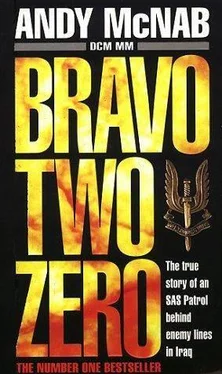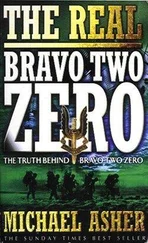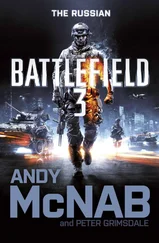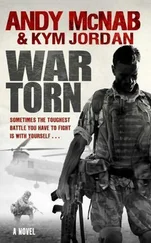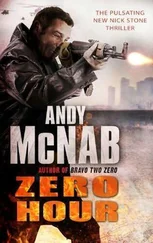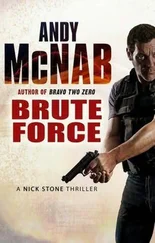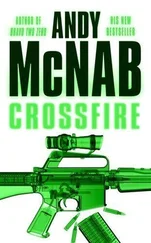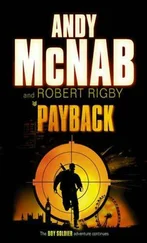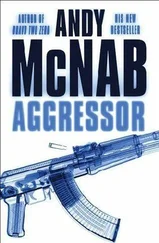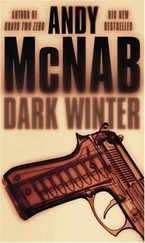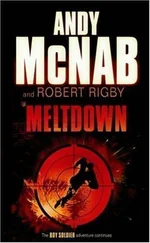“How’s your hands?” I whispered into Dinger’s ear, unsure if we’d been put together because the cell was bugged.
“Shit state,” he said.
That pleased me. I’d have been pissed off if mine were worse than his.
“I’ve still got my map and compass,” I said.
“Yeah, same here. I can’t believe.”
“Gold?”
“Civvies took it. And yours?”
“The ruperts had it away.”
“Wankers, the lot of them.”
For the next half an hour we were like a couple of kids comparing wounds. We took the piss out of the guards and generally let off steam. Then we got the blanket sorted out so that it was under our arses but also coming up our backs an dover our shoulders. As we moved around to make ourselves comfortable, the handcuffs got tighter and tighter.
Sitting with him in the darkness, I learned what had happened to Dinger, Legs, and Bob after we got split up.
As they patrolled along the hedge line Dinger heard a noise and stopped. Behind him, Legs and Bob followed suit. They couldn’t shout a warning forward. The patrol was split.
The noise subsided. They waited for ten minutes but no one returned. They carried on, moving on the bearing. They had only gone 600 feet when there was a challenge from about 50 feet away. Two incoming shots went very close. Then there was fire from many positions. There was a contact, during which Bob got separated from the other two.
Dinger and Legs fired and maneuvred back down to the river. They heard a clearing operation about 450 feet away, lots of firing and shouting. The Iraqis were coming down in extended line.
Dinger and Legs had thirty rounds of link for the Minimi and a mag between them. There was no way they could fight their way through. They had no choice but to cross the river. They got right down to the water’s edge and found a small boat. They tried to unchain it. No luck. They didn’t want to shoot the padlock, so there was only one escape route left.
The river only looked about 300 feet across and slow flowing. The water was so cold it took Dinger’s breath away. As they staggered ashore they found that all they’d done was swim a tributary. They were stuck on a spit of land in the middle of the river, there was firing and shouting on the bank they’d left, and torch lights flashed over the water. They looked for cover.
The spit was overlooked by a roadblock on a pontoon about 250 meters away. There was no cover; both men were freezing cold and shaking convulsively. Legs recce’d around to find how they could get off, and where. They could still hear all the other contacts going on, including one very long one with a Minimi. It must have been Bob. Then there was silence.
Legs found a polystyrene box, which they broke up and stuffed down their smocks for buoyancy. The only exit point from the spit was guarded by the bridge; there was so much enemy activity that their only chance was to swim the main river.
They lay on the ground for an hour, waiting for an opportunity. Their wet smocks and trousers were icing solid; they had to move. Dinger stalled. He’d had a tough enough struggle getting this far, and he doubted his ability to swim the main river. Legs urged him on. They waded in up to their waists and started to swim. The river was 1,600 feet across, the current was flowing fast, and Dinger was soon struggling.
“We can do it, mate,” Legs said. “We can do it.”
At last, Dinger’s feet touched the ground. “That’s bottom,” he whispered as he staggered onto dry land, instinctively carrying on up the shoreline to check for enemy activy.
Looking back across the river, he saw that the current had carried them about a kilometer and a half downstream. He also saw that Legs was still in the water. Dinger ran down to the water’s edge and hauled him out. Legs couldn’t stand.
Dinger had seen a small pump-hut about 30 feet from the bank. He dragged Legs up to it and carried him inside. Dinger was so tired himself now that it took him two hours to get the wet clothes off him.
It was first light. Dinger carried Legs out into the sun, no longer caring about a compromise: the most important thing was to keep him alive. People were starting to work in the fields, forcing Dinger to drag the injured man in and out. He knew it wouldn’t be long before they were discovered. There seemed to be hundreds of troops on the ground.
Legs was going to die. Dinger had to make a decision: did he stay concealed and just watch him die, or did he compromise the position and give Legs the chance of medical attention? It didn’t take much thinking about. Dinger left the hut and stood around until a farmer spotted him.
Dinger ran back inside and closed the door behind him. The farmer ran up, locked it, and took off into the fields ranting and raving. Dinger had already organized an avenue of escape from the back of the hut. Legs was by the generator, his breathing labored. Dinger told him what he was doing and left. He didn’t know if Legs understood. He hoped he did.
He was running along the floor of a dry wadi when a local spotted him. Soon there were whole groups of them, twenty or thirty at a time, paralleling him on either bank. They started shooting. He knew he was going to get caught, but he kept running. He’d had his shamag around his head to try and pass himself off as a local; when they finally converged on him, they knocked him down and used it to bind his hands behind his back. As Dinger looked up, he saw one of them pull a knife. The man started to cut his ear off.
Dinger reckoned this was as good a time as any to indicate the gold on his belt. The locals thought it was Christmas. Off it came, and they started squabbling about it. When they had sorted themselves out, they frog marched Dinger into their town.
The civvies were trying to pull him apart. Several shots were fired, and he thought the end was near. But the shooting had come from a squad of jundies; they waded into the mob and pulled him clear. There must have been some sort of order or reward to deliver prisoners alive.
He was put into a convoy of vehicles, and they crossed back over the river and drove to a camp. Everybody was excited; Dinger was the first white-eye they’d caught.
He was handcuffed to a chair in a room full of officers. They spoke good English and asked him the Big Four. Then they said, “What is your mission?” to which he replied: “I cannot answer that question.”
They said that things would get very bad for him if he didn’t answer the questions: this was war. They asked him again, and he started to reply. He got as far as “I cannot…” and they launched him. He was kicked to the floor and filled in. It sounded as though there was a competition going on; there was a lot of high spirits and chat. Dinger was starting to get worried.
The beasting went on for about thirty minutes. No questions were actually being asked. Then one of the officers jumped up and left the room, and one of them said, “You will be sorry now.”
The man returned with a wooden pole about 4 feet long and 3 inches in diameter. He waded straight into Dinger with it.
It only lasted for about ninety seconds, but Dinger was sure he was going to die. He started going into the cover story.
They asked how many people there were in the search and rescue package, and when Dinger said, “I cannot answer that question,” they started again with the pole.
They brought in an empty 66 and a 203 and asked him how the weapons worked. Dinger refused to show them, which earned him another seeing to with the pole. Then Dinger thought: It’s a weapon, for Christ’s sake, not a state secret. They could find out how to work it from a copy of Jane’s.
He told them the pilot rescue story, and it seemed to work well, but this was an early stage in the questioning. He knew things were going to get a whole lot worse.
Читать дальше
